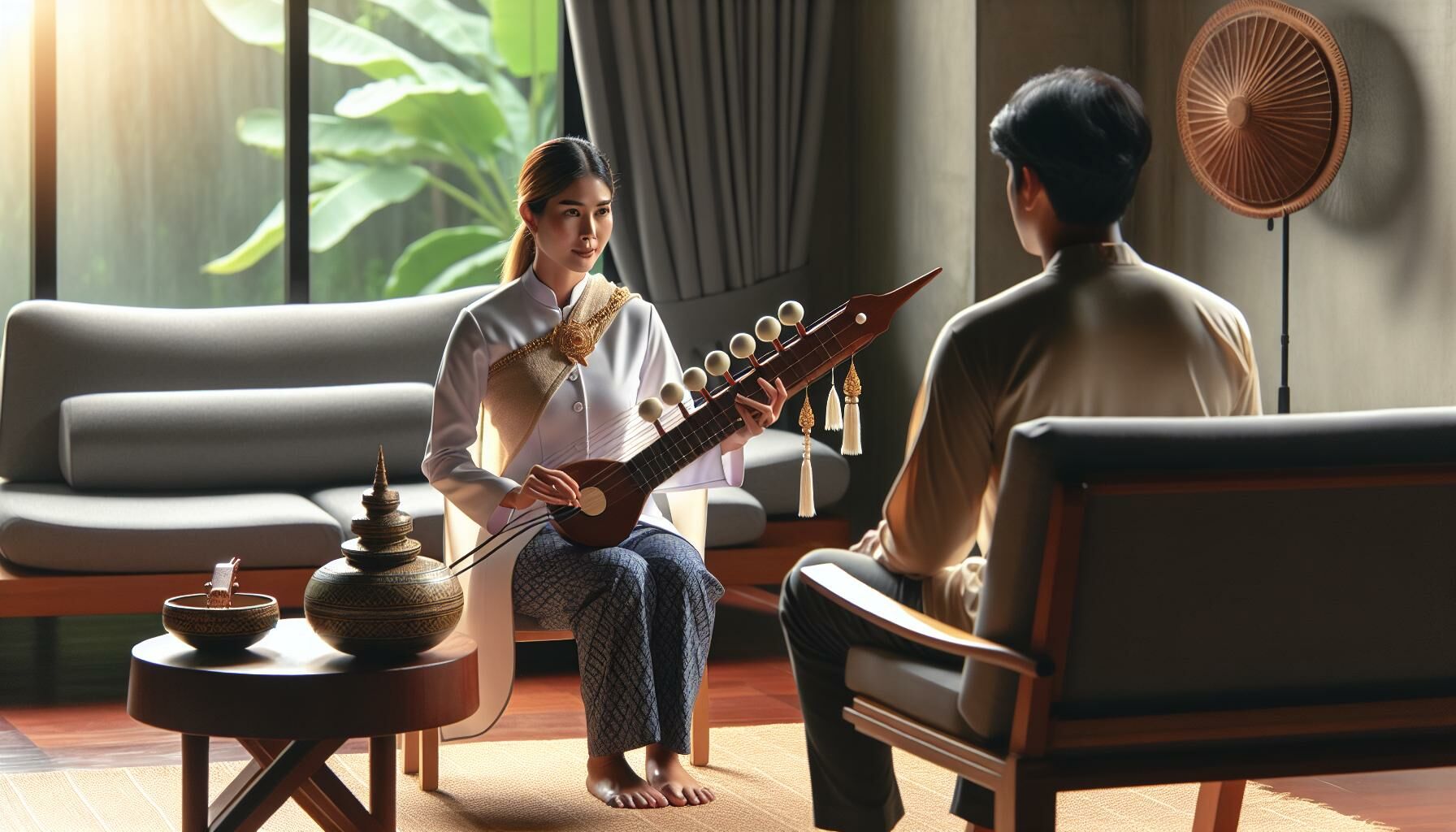The transformative power of music therapy in Thailand

Music therapy in Thailand has become a pivotal aspect of its healthcare and education sectors since 1985, seamlessly blending music with therapeutic and educational methodologies. This innovative method proves effective in recovery, learning enhancement, and encouraging community involvement through volunteer work.
The foundation of music therapy in Thailand was laid within hospitals and clinics before expanding into the educational sector by 1990. Today, the field boasts specialised clinics, comprehensive training programmes for practitioners, and dedicated research efforts aimed at the advantages of music therapy. This growth reflects an increasing acknowledgement of music’s significant role in health and wellness.
An exploration of music therapy in Thailand reveals its broad application spectrum, from leisure activities to precise interventions for specific health issues. Music therapy stands out as a dynamic instrument for improving mental and physical health among individuals. A review of this discipline showcases its considerable evolution and the prospective advancements in therapeutic practices involving music. The continued interest in this area is driven by its extensive potential to facilitate healing and promote overall well-being.
The history and development of music therapy in Thailand

Trace the origins and evolution of music therapy
In the 1980s, Thailand embarked on a pioneering journey by integrating the concept of music therapy into its healthcare practices. Originally drawing from Western methodologies, this approach was thoughtfully adapted to reflect Thai cultural values and meet the needs of its society. The practice initially took root through informal musical sessions within community settings, gradually earning recognition for its therapeutic benefits across a variety of patient demographics and medical conditions. This acknowledgement contributed to its broader acceptance among Thai healthcare professionals, who started incorporating it into more structured clinical settings.
Importantly, while adopting this foreign concept, Thailand skillfully blended traditional melodies and instruments into the therapeutic framework. This strategic integration went beyond mere cultural preservation; it significantly amplified the therapy’s impact and effectiveness for Thai patients by offering them comfort and familiarity through music. In response to the growing demand and success of music therapy in Thailand, educational initiatives were launched to cultivate a new wave of practitioners. These programmes aim at equipping individuals with both theoretical understanding and practical expertise in music therapy, ensuring its sustained growth and application across the country.
This adaptation not only highlights Thailand’s innovative approach towards holistic healthcare but also underscores the importance of culturally tailored interventions in enhancing treatment outcomes. As such, Thailand’s model serves as an exemplary case of how traditional arts can be seamlessly woven into modern therapeutic practices for greater efficacy and patient satisfaction.
Key figures in the development of music therapy in Thailand
Exploring the evolution of music therapy in Thailand reveals a significant journey that has contributed profoundly to both the medical and educational fields. The origins of this transformative movement are deeply rooted in key events and the efforts of influential figures who have driven its growth. Thai universities have played a pivotal role in introducing undergraduate courses in music therapy that established a solid foundation for structured education and professional practice within this speciality.
The expansion into postgraduate programmes marks another leap forward, offering seasoned professionals an avenue to refine their skills and advance their knowledge in music therapy. This step underscores Thailand’s dedication to enhancing the qualifications and capabilities of individuals working within this domain.
It’s also crucial to recognise the pioneering therapists and educators who have successfully integrated music therapy across various sectors, including healthcare, education, and community initiatives in Thailand. Their targeted approaches were carefully designed to resonate with Thai cultural values, ensuring relevancy and effectiveness.
Research has been instrumental in the progression of music therapy within the country. Thai music therapists have committed themselves to rigorous studies aimed at understanding how unique aspects of Thai music can be leveraged for therapeutic benefits. These investigations underscore the adaptability of music therapy techniques across different cultural landscapes, showcasing their global applicability while respecting local traditions.
Today, music therapy in Thailand stands as a testament to remarkable achievements in supporting mental health recovery and physical rehabilitation among diverse populations. This development not only reflects Thailand’s openness to integrating international practices but also highlights its commitment to preserving cultural identity through healing arts.
This account exemplifies how blending innovation with tradition can drive meaningful advancements, serving as an inspirational blueprint for progress in specialised fields like music therapy.
Types of music therapy practices in Thailand

In Thailand, the field of music therapy showcases a diverse and vibrant approach, deeply rooted in its rich musical heritage. The country utilises a broad spectrum of techniques specifically designed to cater to individual needs, playing a crucial role in enhancing the health and recovery processes of individuals.
- Traditional Thai Music Therapy: This style embodies the tranquil and harmonious sounds of traditional Thai instruments, including the khim and ranat. It emphasises promoting relaxation and emotional wellness, showcasing Thailand’s dedication to blending its cultural heritage with therapeutic music.
- Clinical Music Therapy: In clinical settings, the integration of music therapy into treatment protocols is gaining momentum as therapists align with evidence-based practices. This method leverages music within a therapeutic framework, assisting people in advancing their motor skills, enhancing their speech abilities, and navigating emotional experiences more effectively.
- Community Music Therapy: This methodology focuses on bringing people together for music creation, sharing, and enjoyment. It effectively boosts mental health, encourages the development of social connections, and strengthens community bonds.
- Developmental Music Therapy: This cutting-edge tool is crafted to aid in your personal growth and development significantly. Through music, experts guide you in navigating emotions, building friendships, and surmounting educational challenges, thus boosting your intellectual and emotional development.
- Neurologic Music Therapy: An innovative method utilises the power of music and rhythm to boost brain flexibility, showing significant benefits for individuals recovering from strokes or brain injuries. This approach aims to enhance cognitive functions, support language abilities, and improve motor skills using diverse techniques.
Music therapy in Thailand stands out for its innovative integration of traditional and contemporary healing approaches. This highlights the versatility of music therapy, utilising local Thai traditions to effectively address a wide range of health and wellness issues.
Benefits of music therapy in the Thai context

The unique benefits of music therapy specific to Thai populations
Music therapy in Thailand stands out for its innovative fusion of traditional Thai melodies with Western techniques, offering a distinctive approach that not only conserves cultural heritage but also significantly boosts the effectiveness of therapeutic methods. This dual focus on tradition preservation and substantial enhancements in mental, emotional, and physical health aligns closely with Thai cultural values, making it a deeply impactful form of therapy.
In practice, this method incorporates traditional Thai instruments and melodies to create experiences that are deeply meaningful to individuals. The use of familiar tunes can invoke feelings of nostalgia or a sense of belonging, providing comfort and relaxation. This is especially advantageous for elderly patients or those suffering from dementia, where these recognisable sounds can play a crucial role in unlocking memories and eliciting emotions essential for their healing journey.
Another significant advantage is its role in fostering community and societal well-being. Music therapy sessions in community settings encourage participation and social interaction among members, promoting a sense of belonging and support. This approach is key in Thai society, where community and social harmony are highly valued.
Moreover, music therapy in Thailand has shown effectiveness in educational settings, aiding children with developmental delays and learning disabilities. By incorporating music activities that are both enjoyable and culturally relevant, children engage more willingly, enhancing their learning experience and developmental progress.
Music therapy stands out for its adaptability, blending international techniques with Thai customs to create a truly individualised strategy. Therapists excel at designing sessions that accurately meet personal needs, taking into account cultural backgrounds and preferences. Such tailored approaches greatly increase the chances of remarkable results.
In Thailand, music therapy is considered a key part of holistic health and wellness, enriched by cultural subtleties. It effectively combines traditional values with modern therapeutic methods, marking its significance in the country’s healthcare system.
Challenges and opportunities for music therapy in Thailand
Music therapy in Thailand is a dynamic blend of traditional cultural elements and contemporary healing methods aimed at enhancing individual well-being. This approach successfully combines Western therapeutic practices with Thai musical traditions to create an effective form of therapy. It has proven beneficial for various demographic groups, notably supporting children’s development and assisting adults in stroke recovery.
As music therapy gains wider recognition, there is a challenge in maintaining its authenticity while incorporating new techniques. However, addressing these challenges is crucial for the ongoing development and impact of music therapy within Thailand’s healthcare sector. The commitment to preserving the unique aspects of this therapeutic method while integrating innovative practices serves as a model of excellence.
If you are looking for another type of therapy, we would love to recommend you check out our article ‘Explore art therapy in Thailand: a unique blend of tradition and healing.‘
Latest Thailand News
Follow The Thaiger on Google News:


























